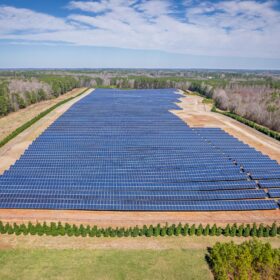SolarEdge rebounds on Q1 earnings surprise
The inverter and energy storage provider posted a second straight quarter of positive cash flow as it recovers from a difficult year.
National Renewable Energy Lab announces layoffs
A statement released by NREL calls the layoffs an “involuntary separation,” thanks the employees for their work and acknowledges that the mission is critical to achieving “an affordable and secure energy future.”
Harnessing the power of agrivoltaics: the future of sustainable land use
In its latest monthly column for pv magazine, IEA PVPS provides a comprehensive overview of the recently released edition of the “Dual Land Use for Agriculture and Solar Power Production: Overview and Performance of Agrivoltaic Systems” report. The 91-page handbook was developed by IEA PVPS Task 13.
Washington State invests $36 million in clean energy
Another $5 million is expected to be awarded later this spring through the state’s Clean Energy Community Grants program.
Ohio Supreme Court rejects local opposition to block 325 MW solar project
Despite Ohio’s intensified local opposition and restrictive solar restrictions in recent years, the state’s Supreme Court sided with the Ohio Power Siting board to allow a 350 MW project in central Ohio.
Strategies for de-risking early-stage renewable energy projects
Over 70% to 90% of early-stage projects fail and are never constructed, according to findings reported by Paces.
Construction begins on 9 MWh battery energy storage system for Massachusetts municipal utility
Convergent Energy and Power will finance, own and operate the energy storage system for the West Boylston Municipal Light Plant.
SunPower regains Nasdaq compliance, reports first profitable quarter in four years
After regaining Nasdaq compliance, the company announced its first profitable quarter in four years, though its financial results have not yet been audited.
Trump budget proposal includes over $20 billion in energy and climate cuts
The budget cancels funds for renewable energy, carbon capture, EV programs and more.
Inverted perovskite solar cell based on ionic salt achieves 26% efficiency
An international team led by the U.S. National Renewable Energy Laboratory (NREL) has used ionic salt for the electron transport layer of a perovskite solar cell to improve device stability and performance. Test results showed a 26% power conversion efficiency with 2% degradation after 2,100 hours of 1-sun operation at 65 C.















